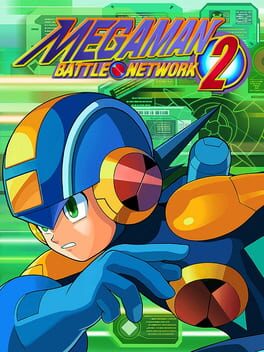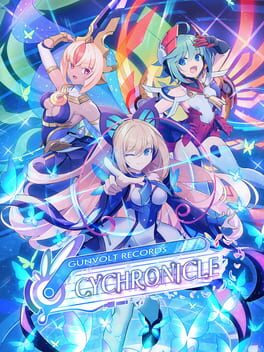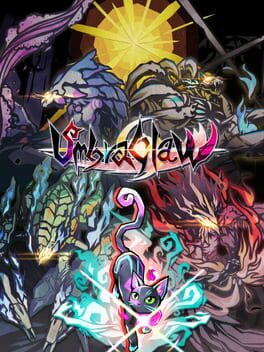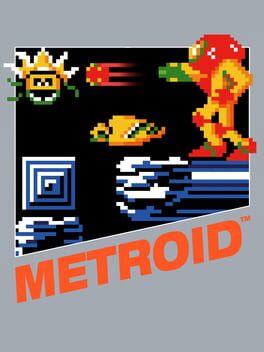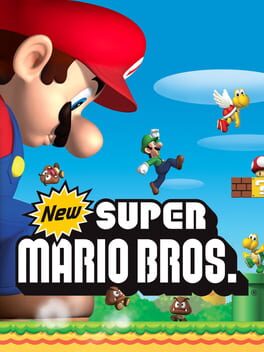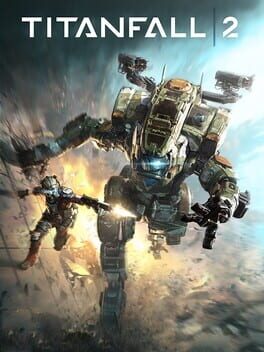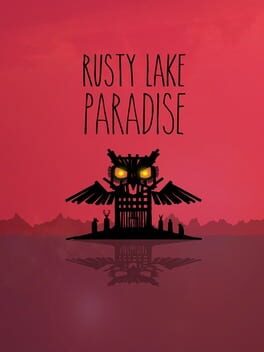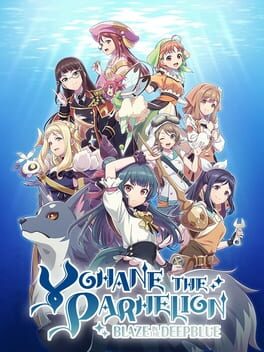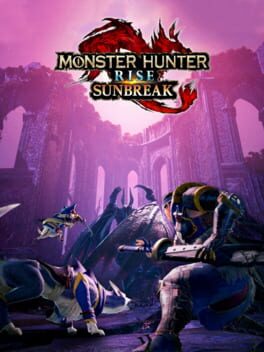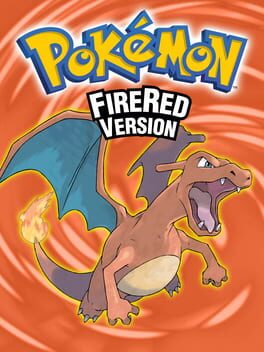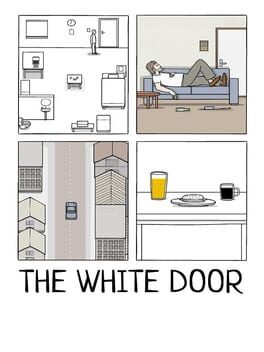Mailman_GV
This game was really weird because if you got rid of the insane amounts of padding and backtracking you'd have an excellent 10ish hour experience. But for whatever reason, they threw in massive sections of going back and forth through different areas just so they could pad out the length of the game. It sucks too because the Netopia and plane scenarios are easily the best parts of the series so far from what I've played, but they're sandwiched in between some of the most monotonous, boring sections I've ever experienced in an RPG. Still, this is a good game with some really funny degenerate combos like Tree Bomb + Prism, Gater, etc. Also the writing is honestly half the fun of this game, the dialogue is the perfect combination of intentionally and unintentionally hilarious.
2011
So all the DLC is out now, adding up to a total of 52 songs (counting full versions of certain songs separately), which is a considerable improvement from the initial number. I S+ ranked, full combo'd all songs on Easy and Normal, and did the same for S rank and full combo on Hard. So I think I'm finished with the game for good now.
The song selection here is very strong, but I don't think I can improve my rating beyond 3 stars still, because some of this game's charting and general difficulty scaling is weird. Some songs on Hard difficulty are super simple while others feel more like they'd fit Expert difficulty more. Easy mode should be, you know, easy, but it ended up being more challenging than Normal to S+ rank because there are less notes overall (if you screw up, it reduces your score considerably more). Expert mode felt way way too hard for me as someone who doesn't play rhythm games, but that's not that big of a deal. Overall I'm happy that Gunvolt Records Cychronicle exists, but I think I'm even happier that I can now move on from the game.
Also according to the steam charts I'm like the only person who plays this game LOL
The song selection here is very strong, but I don't think I can improve my rating beyond 3 stars still, because some of this game's charting and general difficulty scaling is weird. Some songs on Hard difficulty are super simple while others feel more like they'd fit Expert difficulty more. Easy mode should be, you know, easy, but it ended up being more challenging than Normal to S+ rank because there are less notes overall (if you screw up, it reduces your score considerably more). Expert mode felt way way too hard for me as someone who doesn't play rhythm games, but that's not that big of a deal. Overall I'm happy that Gunvolt Records Cychronicle exists, but I think I'm even happier that I can now move on from the game.
Also according to the steam charts I'm like the only person who plays this game LOL
2024
UmbraRAW.
I've only completed one playthrough (and got the best ending) so far but I think that's enough for now to write a review. Umbraclaw is an extremely unique platformer, to the point where at times it feels like it fits into some brand new genre. You explore levels that range from sprawling mazes to linear obstacle courses, doing your best to avoid death. But dying is a sort of reward too, as it gives you additional abilities to make future survival easier. BUT, die too much and Kuon loses her cat-manity, gaining a humanoid form and turning the game into something much more action-focused. You're able to revert back to feline form (on the base difficulty, at least), but the second half of the game makes this process very costly, so you are often forced to choose what form you want to take. By themselves, these forms have their own pros and cons -- some bosses I found easier in feline form and others were a cakewalk in humanoid form. This sort of game design tightrope is unprecedented, at least from the games I've played, and creates some extremely compelling decision making.
This is only compounded further by the fact that the story will shift depending on various factors, including what form Kuon has taken by the end of the game. Regarding the story, I think it's pretty solid, mainly excelling in atmosphere and providing a host of interesting characters along the way. I really like that Locke is a Gunvolt reference while also being his own unique character with a lot of personality. I played with Japanese voices but I hear good things about the English cast as well. I will say, the ending I got wasn't super sastisfying--it was very short and didn't do anything too interesting--but it sounds like the bad endings are the ones that do more creative stuff with the concept, so I'll withhold judgement a little more for that.
The last thing I'll mention is the gorgeous presentation. A lot of people liken this art style to Okami's but Umbraclaw goes for a sort of paper-craft aesthetic that is wholly different from anything else I've played. The music from III hits hard as always, though I did find it disappointing that all the levels essentially share the same two music tracks.
Overall I'm really glad Inti is experimenting with new IP, because a game like this has never really been done before, and I'm very glad it exists now.
I've only completed one playthrough (and got the best ending) so far but I think that's enough for now to write a review. Umbraclaw is an extremely unique platformer, to the point where at times it feels like it fits into some brand new genre. You explore levels that range from sprawling mazes to linear obstacle courses, doing your best to avoid death. But dying is a sort of reward too, as it gives you additional abilities to make future survival easier. BUT, die too much and Kuon loses her cat-manity, gaining a humanoid form and turning the game into something much more action-focused. You're able to revert back to feline form (on the base difficulty, at least), but the second half of the game makes this process very costly, so you are often forced to choose what form you want to take. By themselves, these forms have their own pros and cons -- some bosses I found easier in feline form and others were a cakewalk in humanoid form. This sort of game design tightrope is unprecedented, at least from the games I've played, and creates some extremely compelling decision making.
This is only compounded further by the fact that the story will shift depending on various factors, including what form Kuon has taken by the end of the game. Regarding the story, I think it's pretty solid, mainly excelling in atmosphere and providing a host of interesting characters along the way. I really like that Locke is a Gunvolt reference while also being his own unique character with a lot of personality. I played with Japanese voices but I hear good things about the English cast as well. I will say, the ending I got wasn't super sastisfying--it was very short and didn't do anything too interesting--but it sounds like the bad endings are the ones that do more creative stuff with the concept, so I'll withhold judgement a little more for that.
The last thing I'll mention is the gorgeous presentation. A lot of people liken this art style to Okami's but Umbraclaw goes for a sort of paper-craft aesthetic that is wholly different from anything else I've played. The music from III hits hard as always, though I did find it disappointing that all the levels essentially share the same two music tracks.
Overall I'm really glad Inti is experimenting with new IP, because a game like this has never really been done before, and I'm very glad it exists now.
2022
You already know this game is good, so here’s some quick thoughts you can skim through:
- The game felt too easy more often than it felt too hard. Some bosses like Morgott and Maliketh melt in 5 seconds and it’s really a shame.
- Like DS1, the level design falls off a little past the halfway point. Not as bad but still noticeable.
- With that being said, the vast majority of the legacy dungeons are outstanding and some of the best in Fromsoft history.
- Fromsoft has absolutely peaked with NPCs and their questlines here. Ranni’s is probably the best questline they’ve ever done.
- Build variety is very good but the amount of faith scaling remembrance weapons is insane and it honestly was really frustrating as someone using an intelligence build.
- The lore, while enjoyable, seems to have a lot of missing parts to it, primarily when it comes to the motivations behind major characters and their decisions. Hopefully this gets cleared up in the DLC.
- The game felt too easy more often than it felt too hard. Some bosses like Morgott and Maliketh melt in 5 seconds and it’s really a shame.
- Like DS1, the level design falls off a little past the halfway point. Not as bad but still noticeable.
- With that being said, the vast majority of the legacy dungeons are outstanding and some of the best in Fromsoft history.
- Fromsoft has absolutely peaked with NPCs and their questlines here. Ranni’s is probably the best questline they’ve ever done.
- Build variety is very good but the amount of faith scaling remembrance weapons is insane and it honestly was really frustrating as someone using an intelligence build.
- The lore, while enjoyable, seems to have a lot of missing parts to it, primarily when it comes to the motivations behind major characters and their decisions. Hopefully this gets cleared up in the DLC.
1986
2016
2018
(Disclaimer: I know next to nothing about Love Live.)
It's kind of crazy that it took this many years for Inti Creates to make a standard metroidvania. They've made games that fall fairly neatly into the genre, sure, but the worlds are usually much more linear and less interconnected.
This game is a full blown metroidvania, but it's also a very safe one; it doesn't really do anything you haven't seen before. You got a slide with some fun advanced tech to it, and summons that I assume are similar to the core gameplay of Ender Lilies. As you progress through the game you get access to a double jump essentially ripped straight out of Hollow Knight, and a wall climb ability that's reminiscent of Celeste. These are pretty fun abilities, and Inti always does a great job at making movement enjoyable.
Still, while it is a little derivative, this game is really charming. The dialogue gets genuinely funny at times, and the various summon abilities can be pretty goofy. Inti has once again nailed their pixel art aesthetic and fantastic music (This song in particular is great).
Also I've seen some criticisms that the game is too short... Guys, a 7 hour playtime for a metroidvania is pretty standard for the genre. I think Hollow Knight was so good and content-packed that it dramatically shifted people's standards. Don't be deterred by this game's length, there is absolutely enough content to be enjoyed.
Anyway I would recommend this game if you're looking for a straightforward lighthearted metroidvania experience, or if you're already a fan of Inti or Love Live stuff. Laptop attack reigns supreme.
It's kind of crazy that it took this many years for Inti Creates to make a standard metroidvania. They've made games that fall fairly neatly into the genre, sure, but the worlds are usually much more linear and less interconnected.
This game is a full blown metroidvania, but it's also a very safe one; it doesn't really do anything you haven't seen before. You got a slide with some fun advanced tech to it, and summons that I assume are similar to the core gameplay of Ender Lilies. As you progress through the game you get access to a double jump essentially ripped straight out of Hollow Knight, and a wall climb ability that's reminiscent of Celeste. These are pretty fun abilities, and Inti always does a great job at making movement enjoyable.
Still, while it is a little derivative, this game is really charming. The dialogue gets genuinely funny at times, and the various summon abilities can be pretty goofy. Inti has once again nailed their pixel art aesthetic and fantastic music (This song in particular is great).
Also I've seen some criticisms that the game is too short... Guys, a 7 hour playtime for a metroidvania is pretty standard for the genre. I think Hollow Knight was so good and content-packed that it dramatically shifted people's standards. Don't be deterred by this game's length, there is absolutely enough content to be enjoyed.
Anyway I would recommend this game if you're looking for a straightforward lighthearted metroidvania experience, or if you're already a fan of Inti or Love Live stuff. Laptop attack reigns supreme.
There's two things that primarily make me love this game, and they're things I wasn't really expecting when starting out.
1. Progression feels extremely good. The feeling of hitting a wall with a boss and doing your absolute best to persevere despite the setbacks and eventually succeeding is some weird mixture of exhilaration and relief, and it's awesome.
2. Throughout the game, I felt as if I was having a conversation with Miyazaki himself. It's especially the case in the first half of the game, where the game is constantly teaching you new mechanics and ways to avoid traps and the like. Most people mention that the game falls off in the second half, but I think that's only half true. Lost Izalith is clearly unfinished and New Londo is obnoxious, but I quite enjoyed the Tomb of the Giants and the Duke's Archives. In general though, I do think the game is strongest in the beginning up to Anor Londo. The game is constantly teaching you new things and Miyazaki is a marvelous asshole.
Awesome game and a great start to my FromSoft journey :)
1. Progression feels extremely good. The feeling of hitting a wall with a boss and doing your absolute best to persevere despite the setbacks and eventually succeeding is some weird mixture of exhilaration and relief, and it's awesome.
2. Throughout the game, I felt as if I was having a conversation with Miyazaki himself. It's especially the case in the first half of the game, where the game is constantly teaching you new mechanics and ways to avoid traps and the like. Most people mention that the game falls off in the second half, but I think that's only half true. Lost Izalith is clearly unfinished and New Londo is obnoxious, but I quite enjoyed the Tomb of the Giants and the Duke's Archives. In general though, I do think the game is strongest in the beginning up to Anor Londo. The game is constantly teaching you new things and Miyazaki is a marvelous asshole.
Awesome game and a great start to my FromSoft journey :)
2009
The true Demon's Souls starts here.
Demon's Souls is a beautiful game that would have killed my interest in the whole Souls series if I had started with it first instead of DS1. People often use the term "product of its time" but this might be the first instance where I've unironically felt that a game could never be made the same way before or after it released.
Demon's Souls was formed by its extremely abnormal development conditions, and came out the other side as a sort of anti-2000's video game. In a generation that made sure to walk you through everything, Demon's Souls goes the complete opposite direction and refuses to explain core game mechanics to you. In some cases like with World Tendency, it's a bit of a mixed bag. I like the mechanic in theory but the game deliberately masks its overall significance and how you can go about raising and lowering your tendency. Honestly though, the most baffling example of the game explaining mechanics poorly is that you can fucking clamber in this game, but the game does such a terrible job showcasing it. I had no idea this was a thing until Latria, and as a result I completely missed out on Ostrava's quest line (which blows, because he's an extremely cool character). These issues aren't really a big deal because Demon's Souls is, by nature, rough around the edges. I just wish I knew the actual "roughness" of those edges instead of having to guess on the fly or Google the answer.
But Demon's Souls isn't just a game defined by its mechanics (tell that to Bluepoint though, they're still figuring that part out). The vibe of this game is just...perfection. A brutalist medieval world confronting a deeply existential, lovecraftian threat is fucking awesome and honestly a better premise than that of Dark Souls, even if the series later took its concepts in more interesting directions. The audiovisual experience of Demon's Souls is truly something special, and I now understand why people are disappointed by the remake--Bluepoint really dropped the ball in this regard.
My other criticisms are fairly basic. Boletaria is a fantastic area, Latria and Shrine of Storms are quite strong, but the other areas are pretty lame. Some bosses are very well designed, like Tower Knight, whereas others are either extremely obnoxious until you figure out their one random weakness (Armor Spider), pathetically easy (Leechmonger), or aesthetically and functionally unfinished (Maneater). It's a shame because it's clear they were experimenting and figuring out what sticks, but some of these DID stick, and I wish there were more of those types of fights in the game.
Overall I appreciate Demon's Souls for what it is, but I can also acknowledge that FromSoft's subsequent games do basically everything better, except maybe atmosphere/vibe in some instances. Worth a play but definitely don't start your Souls journey here.
Demon's Souls is a beautiful game that would have killed my interest in the whole Souls series if I had started with it first instead of DS1. People often use the term "product of its time" but this might be the first instance where I've unironically felt that a game could never be made the same way before or after it released.
Demon's Souls was formed by its extremely abnormal development conditions, and came out the other side as a sort of anti-2000's video game. In a generation that made sure to walk you through everything, Demon's Souls goes the complete opposite direction and refuses to explain core game mechanics to you. In some cases like with World Tendency, it's a bit of a mixed bag. I like the mechanic in theory but the game deliberately masks its overall significance and how you can go about raising and lowering your tendency. Honestly though, the most baffling example of the game explaining mechanics poorly is that you can fucking clamber in this game, but the game does such a terrible job showcasing it. I had no idea this was a thing until Latria, and as a result I completely missed out on Ostrava's quest line (which blows, because he's an extremely cool character). These issues aren't really a big deal because Demon's Souls is, by nature, rough around the edges. I just wish I knew the actual "roughness" of those edges instead of having to guess on the fly or Google the answer.
But Demon's Souls isn't just a game defined by its mechanics (tell that to Bluepoint though, they're still figuring that part out). The vibe of this game is just...perfection. A brutalist medieval world confronting a deeply existential, lovecraftian threat is fucking awesome and honestly a better premise than that of Dark Souls, even if the series later took its concepts in more interesting directions. The audiovisual experience of Demon's Souls is truly something special, and I now understand why people are disappointed by the remake--Bluepoint really dropped the ball in this regard.
My other criticisms are fairly basic. Boletaria is a fantastic area, Latria and Shrine of Storms are quite strong, but the other areas are pretty lame. Some bosses are very well designed, like Tower Knight, whereas others are either extremely obnoxious until you figure out their one random weakness (Armor Spider), pathetically easy (Leechmonger), or aesthetically and functionally unfinished (Maneater). It's a shame because it's clear they were experimenting and figuring out what sticks, but some of these DID stick, and I wish there were more of those types of fights in the game.
Overall I appreciate Demon's Souls for what it is, but I can also acknowledge that FromSoft's subsequent games do basically everything better, except maybe atmosphere/vibe in some instances. Worth a play but definitely don't start your Souls journey here.
You know a game is good when you suddenly start grinning from ear to ear after realizing just how much fun you're having.
Monster Hunter Rise: Sunbreak's core gameplay is unbelievably polished. I haven't felt this sense of cohesion between combat and movement since Titanfall 2. Every single weapon has so much depth; I have been almost exclusively been using greatsword as of writing this review and there are still so many switch skills and builds that I haven't even tried yet. The portable team has finally achieved a perfect balance of empowering the player while still making the monsters feel threatening. It isn't insanely tough, but monsters--especially as you get into later master ranks--are quite intimidating with how quickly and relentlessly they can throw out attacks.
I've heard some complaints about how the size of the new roster isn't as robust as some would have liked, but in this case I'm glad Capcom went with quality over quantity. Every single new fight in this game is fantastic. And while it may take some time to get to the brand new guys, the master rank versions of base Rise monsters got really interesting updates to their movesets, and in some cases this can change the encounter dramatically.
The only real criticism I have for this game is a super small one: there are two monsters present here (if you've played through master rank, you probably know which ones I'm talking about) that really should have been incorporated into the story better considering their significance to the Monster Hunter universe. They were still wonderful fights, but I wish they were given more importance in the plot (which was actually quite entertaining for a Monster Hunter story, I might add).
I don't know if I can say that Monster Hunter Rise: Sunbreak is the perfection of the Monster Hunter formula, since Rise as a whole has a very different design philosophy from the other, more grounded MH titles. However, I can say that this game perfects the formula that base Rise set up and is my favorite Monster Hunter experience to date. Here's hoping for some great title updates in the next 6+ months!
Monster Hunter Rise: Sunbreak's core gameplay is unbelievably polished. I haven't felt this sense of cohesion between combat and movement since Titanfall 2. Every single weapon has so much depth; I have been almost exclusively been using greatsword as of writing this review and there are still so many switch skills and builds that I haven't even tried yet. The portable team has finally achieved a perfect balance of empowering the player while still making the monsters feel threatening. It isn't insanely tough, but monsters--especially as you get into later master ranks--are quite intimidating with how quickly and relentlessly they can throw out attacks.
I've heard some complaints about how the size of the new roster isn't as robust as some would have liked, but in this case I'm glad Capcom went with quality over quantity. Every single new fight in this game is fantastic. And while it may take some time to get to the brand new guys, the master rank versions of base Rise monsters got really interesting updates to their movesets, and in some cases this can change the encounter dramatically.
The only real criticism I have for this game is a super small one: there are two monsters present here (if you've played through master rank, you probably know which ones I'm talking about) that really should have been incorporated into the story better considering their significance to the Monster Hunter universe. They were still wonderful fights, but I wish they were given more importance in the plot (which was actually quite entertaining for a Monster Hunter story, I might add).
I don't know if I can say that Monster Hunter Rise: Sunbreak is the perfection of the Monster Hunter formula, since Rise as a whole has a very different design philosophy from the other, more grounded MH titles. However, I can say that this game perfects the formula that base Rise set up and is my favorite Monster Hunter experience to date. Here's hoping for some great title updates in the next 6+ months!
2020
The first Rusty Lake game with an ARG element! This one was fantastic, I really like the slow shift in storytelling over the course of this series. It started out with interesting but cryptic lore, and now it's trying to combine that with genuinely strong character-driven stories, and so far it's been working very well. I mean, they took one of the more forgettable characters and made him immensely more sympathetic and interesting in this one, so clearly they're doing something right.
